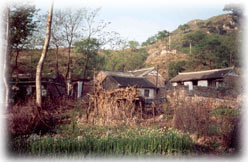 |
 |
||
 |
|||
|
RELATED THEMES development environment OTHER THEMES IN NE COLLECTION THEMES IN SW COLLECTION BACKGROUND |
agriculture in the northeast collection
Manure from pigs and chickens is generally used on the fields rather than chemical fertiliser. China 38 explains: "We mostly depend on natural manure. Who can afford to buy chemical fertiliser which is very expensive since we have little income a year?" Although there have been recent improvements in irrigation with the introduction of motorised pumps it appears that households have to pay for this facility. Agricultural production is limited to the amount of land assigned to each household. Every five years the cultivable land is re-distributed between households, according to changes in individual household size brought about by marriage, death and children. China 30 explains: "For example if a girl leaves the village by marriage or an old man dies, then the family will be having more land than others, while some children don't have their own land yet." Women who move into the village by marriage "will get theirs in the re-division". It is clear that women are responsible for much of the agricultural work; most men are employed outside the village doing contract work in the cities. Men try to return home to help at busy times such as harvest, and women will also go to their friends, neighbours and family for assistance. But several highlight just how hard and relentless the agricultural cycle is: "Life is hard and exhausting for us women all the year round" (China 38). One woman recounts her experience of planting a new hybrid variety of maize and villagers' initial scepticism. "When the hybrid maize in irrigated land was first introduced, few people believed it would work… They refused to try. I was the first to risk the new one… Some people laughed at me… That year we had a very good harvest. My grandfather… was still alive then. When he saw carts loaded with corn cobs coming home one after another, he got very excited and surprised. 'My goodness. How could you get so much?'" (China 30). quotes about agriculture"Since almost all the men have left the village with only the old and the young at home, all work in the fields is left to women." "Spring is the time to get the land ready, and to prune the trees. Then it is time for sowing. As the seedlings come up, the hoeing starts… and then there is the time for spreading manure and also watering. When there is a drought we have to shoulder water up to the fields. That is the most exhausting work. Autumn is the busy season for harvesting. After harvesting we still have to make the land ready again for planting winter wheat. [Then]…the work in the field comes to an end. But even in winter we women cannot have a rest. We have to go up the mountains to collect firewood… Then it is time to prepare for the New Year, killing a pig, preserving the meat to make it last for the whole year." "Even using the water from the reservoir costs 6 yuan an hour. This year we spent about 200 yuan on watering the land." "A large part of the money that men earn by working in other places has to be spent on things like that." "Work in the fields is heavy, so you need a son. And things will be especially difficult if you do not have anyone who cares for you in the leading group of the village. My family do not have any relatives among the leaders, so good things never come to us." "It was not easy to dig holes [for planting fruit trees]. There were so many rocks. It is a bit easier after it rains in summer… First we must get rid of the rocks. If we find loose soil we will plant trees there. Now we have developed two mu and planted 100 trees. The problem is that we don't have the resources to go on with the work. Money is a problem. In addition we are short of hands… The husbands usually come back before the time to harvest wheat. Some of them come back in December…" "All together [we had] 6 fen, but it was scattered in 15 different places, some were only small pieces [of land] but located far away. You can imagine the hardship we had rushing around." |
|
 Wheat, maize and millet are the main crops; people also grow their own vegetables, such as cucumber, sweet potatoes, peppers and Chinese cabbage. It seems that horticulture is becoming increasingly important. Several narrators refer to the marketing of apricot kernels and persimmon fruits and others have, relatively recently, started growing fruit trees on previously barren mountain slopes.
Wheat, maize and millet are the main crops; people also grow their own vegetables, such as cucumber, sweet potatoes, peppers and Chinese cabbage. It seems that horticulture is becoming increasingly important. Several narrators refer to the marketing of apricot kernels and persimmon fruits and others have, relatively recently, started growing fruit trees on previously barren mountain slopes.